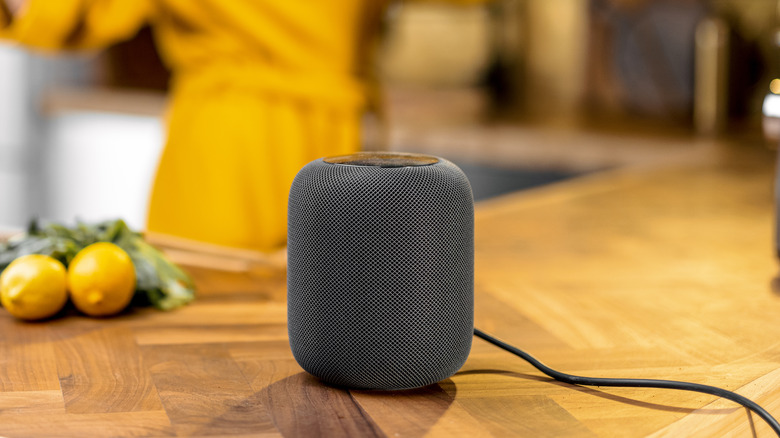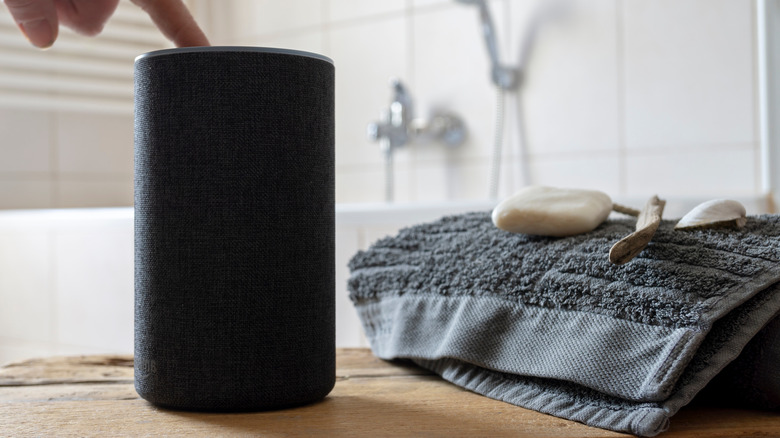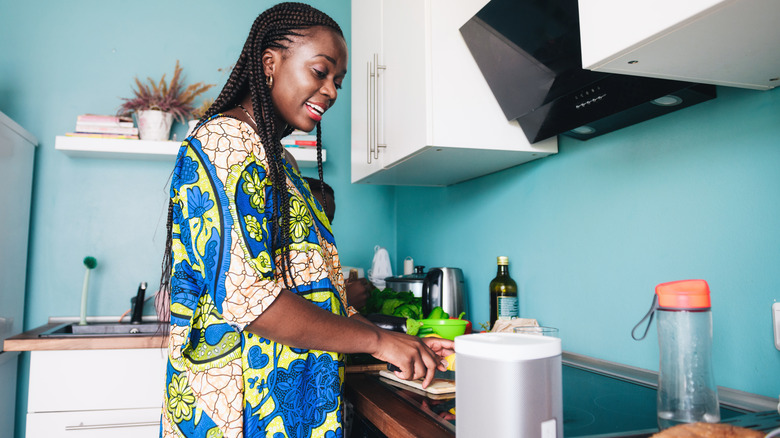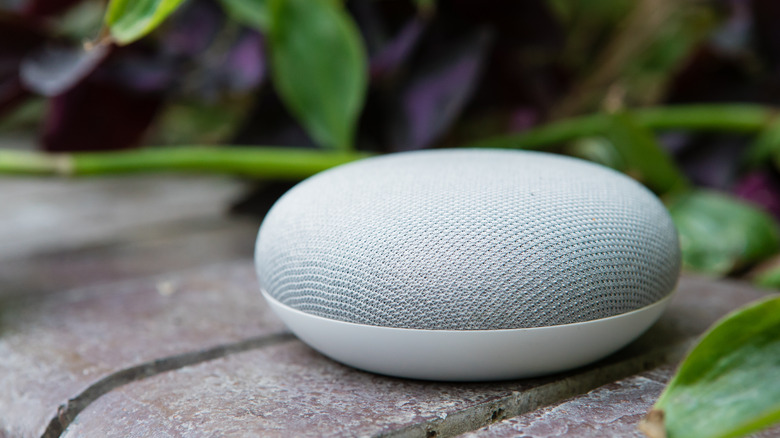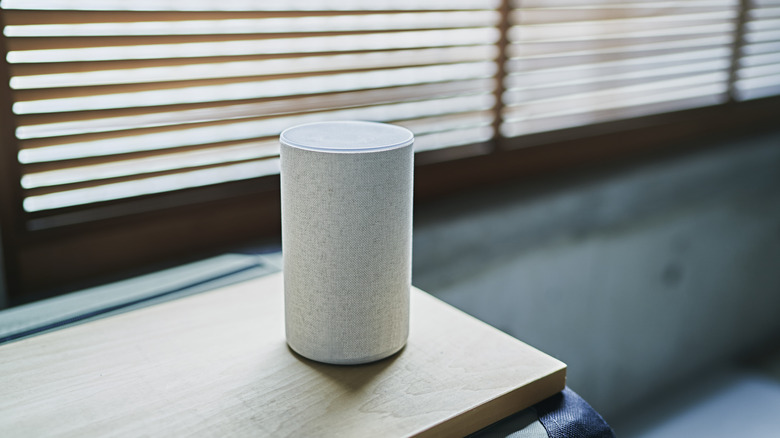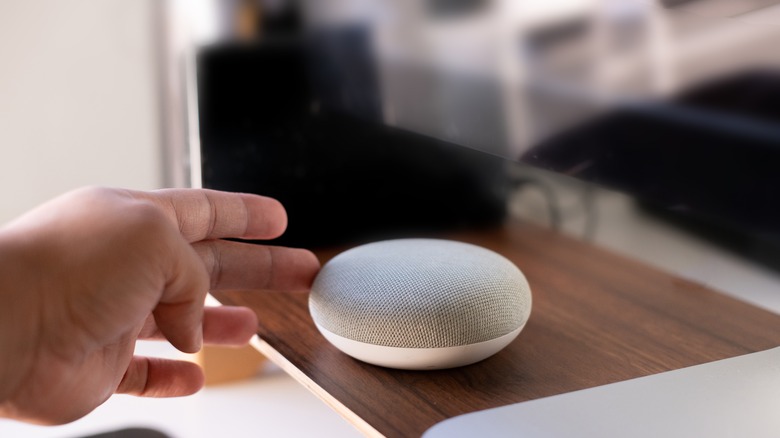The Worst Locations To Put Your Smart Home Speaker
Owning a smart home speaker is like having a personal assistant that's always available to make your day easier. Although it may be tempting to have it follow you around the house, toting it from room to room may not be the best idea. After all, it is a piece of technology and an expensive one at that. Environmental factors such as heat and humidity could harm its internal components, or spilled food, liquid, and stains could damage the exterior. That's why the bathroom, kitchen, and backyard are among the worst locations for your smart home speaker.
One of the hidden downsides to Alexas and similar devices, such as Google Nest, is that they attract germs if you're not careful. Plus, they must be within a certain range of your wireless router and away from other audio devices in order to function properly. With all of these factors combined, it's important to be strategic about the placement of your smart home speaker. By putting it in a suitable, designated spot, it will have everything it needs to enhance your everyday life.
In the bathroom
This may be obvious, but it's worth emphasizing that the moist environment of your bathroom is not an ideal place for your technology. The humidity and dampness of the atmosphere may cause the electrical structure of your smart home speaker to become damaged. In fact, there are several items that you should really stop storing in your bathroom for these reasons. We don't blame you for wanting to sing to your favorite songs while you shower, but to avoid harming your sound system, you may want to sing acapella instead.
Plus, if you value good hygiene, there's another reason to keep your smart speaker far away from the bathroom. Bathrooms contain more bacteria than any other room in your house. Surfaces such as bathroom floors, counters, and handles contain hundreds of millions of bacteria; toilets, in particular, are a prolific source of germs. Needless to say, your smart speaker will quickly become a portable germ-spreader if it is frequently placed in the bathroom.
In the kitchen
As we've mentioned, technology is susceptible to water damage. With that in mind, another location that may not be optimal for your smart home speaker is the kitchen. Accidental splashes occur all too frequently, not to mention everyday messes and spills. In the event of water damage, it is important to unplug your smart speaker right away and allow it to dry before using it. However, these accidents are easy to miss, especially in a room as full of distractions as the kitchen. In this scenario, the best way to avoid damaging your smart speaker is to avoid placing it near faucets and on cluttered countertops.
It's also wise to keep your speaker far away from your stovetop, oven, or any other heat source. Heat exposure from cooking in the kitchen could adversely affect your smart home speaker. Electronics are sensitive to increases in temperature. Coupled with the steam from your stovetop, placing your smart speaker in the kitchen could have negative consequences overall.
In the backyard or in front of a window
Based on the aforementioned reasons, one of the worst locations for your smart home speaker is in the backyard or anywhere outdoors. Even if your speaker has water-resistant features, it may not withstand being accidentally dropped in the pool or an unexpected rainstorm if it's forgotten outside. Although a good sound system can help to transform your backyard into a party space, this may not be the right job for your Amazon Echo or Google Nest Mini. Exposure to heat, humidity, unexpected weather, and spilled summer cocktails can spell disaster for these devices.
Further, you may not want to keep your smart speaker in front of a window. Exposing it to direct sunlight could cause the internal temperature of your speaker to rise significantly, which could cause its components to malfunction. Further, placing your speaker near an open window increases the risk of theft, especially if it is located on the ground floor. This can be especially dangerous because your smart home speaker can grant someone access to your other devices, your bank account, and even your car.
Areas of your home with a weak Wi-Fi signal
It's not uncommon for some areas of your home to have weaker Wi-Fi connectivity. However, if you want your smart home speaker to function optimally, place it in an area where the wireless signal is strongest. Weak connectivity can compromise the responsiveness of your speaker and affect the other devices it is paired with. Your Amazon Echo should be no further than 30 feet from your wireless router to function at its best. Other factors may affect your device as well. For example, some electronic devices, baby monitors, and microwaves could cause your Amazon Echo to work less effectively. If your smart speaker is slow to respond to voice commands, chances are you are dealing with a connectivity issue.
There are options out there to increase the range of your speaker and allow it to work effectively in more areas of your home. If you have a Google smart home speaker, you can purchase Google Wi-Fi points to increase the bandwidth. Google's Wi-Fi mesh system is connected by various points you can set up to your liking, so your smart home speaker can run efficiently even in the basement or garage.
Near other speakers and sound systems, including your TV
To help your smart home speaker do its job as efficiently as possible, avoid placing it near other audio devices like a radio, Bluetooth sound system, or TV. Doing so may result in you competing with other voices for Alexa or Google's attention. For example, given that your Amazon Echo is always listening, it may accidentally pick up on a voice command from your TV. Background noises will make it more difficult for Alexa to hear your voice clearly. It may be so busy listening to the voices coming from your radio that it will not hear your call.
Similarly to the previous slide, you may also run into connectivity issues by having too many devices connected to your wireless network at the same time. If you have a smart TV, wireless speakers, phones, and laptops connected to the same Wi-Fi, you may be overloading your network and disrupting the signal of your smart speaker.
